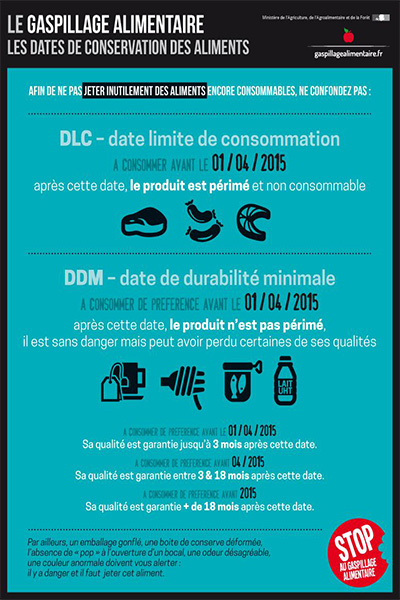 Food Waste
Food Waste Fight against Food Wast
Food waste is a major economic and environment challenge, and it's now a primary target of the Minister of Ecology.
No law, but a contract
It was a critical step of the law on energy transition. It was unanimously approved by deputies. "It" is an article looking to reduce food waste in supermarkets, but it was nullified by the Constitutional Council for reasons in relation with its implementation process. It is now reborn in the form of a "voluntary commitment convention".
Professional from mass distribution and government representatives have been gathered together on August 27th by Ségolène Royal, Minister of Ecology and Sustainable Development, and the reached a common ground: destruction of edible food products will be forbidden, and unsold products must be offered to charities. In exchange, companies concerned benefit from a 60% tax rebate on total value of products given. Secondly, the definition of shelf life is to limiting; it has been deleted on specific non-perishable goods such as salt, oil or vinegar.
This "trust contract" should be signed by all shops having a sale surface above 400 m2 by September 2016. The pressure put on their brand image should be enough to push distributors to commit, says Ségolène Royal. If it is not the case, the minister plans to use legal provisions.
Multiple responsibilities
The French action is a snowball effect: on demand from Eurodeputy Dominique Delahaye, the European Parliament passed an amendment on July 19th on food waste fight in mass distribution. The text drew inspiration from a law on energy transition rejected in the meantime by the Constitutional Council.
However, mass distribution is not the only culprit of food waste. In France, according to a study from the Ministry of Ecology carried out in 2010, only 11% of losses are due to mass distribution, and 2% to food industry, 6% to retail sale, 15% to catering, but most of all 67% to households. The Federation of Food Banks underline the fact that supermarkets are responsible for 35% of the supply of charities, i.e. 100,000 tons of food and 200 million meals per year.
Focus on a 0-waste target
In order to limit wastes, all players must change their mindset. The French seem to throw away 20 to 30 kg of food every year, of which 7 are still packaged. The main cause of this waste surplus is a poor management of shopping, which is often superior to the real needs of consumers.
The Minister of Ecology is looking to pull other levers by setting ambitious targets for 2025: to reduce wastes by 50% in communities and by 7% in households.
In 2014, 58 French territories won over the call for project from the government entitled "Zero waste, zero wastage". In exchange for technical and financial support, they commit to reduce food wastes as much as they can. The city of Roubaix challenged 101 families to reduce their wastes by 50%. The prize was a 50% refund of their tax on household waste. In Paris, 80 restaurants committed to collect their waste to use energy recycling (methanization).
Such initiatives could be extended to more players. Food waste is still a major social, economic, environmental and ethical challenge. Figures show how much work needs to be done: every year, 6 million tons of food end up in waste management plants. This is 20 billion euros net thrown away by France.

